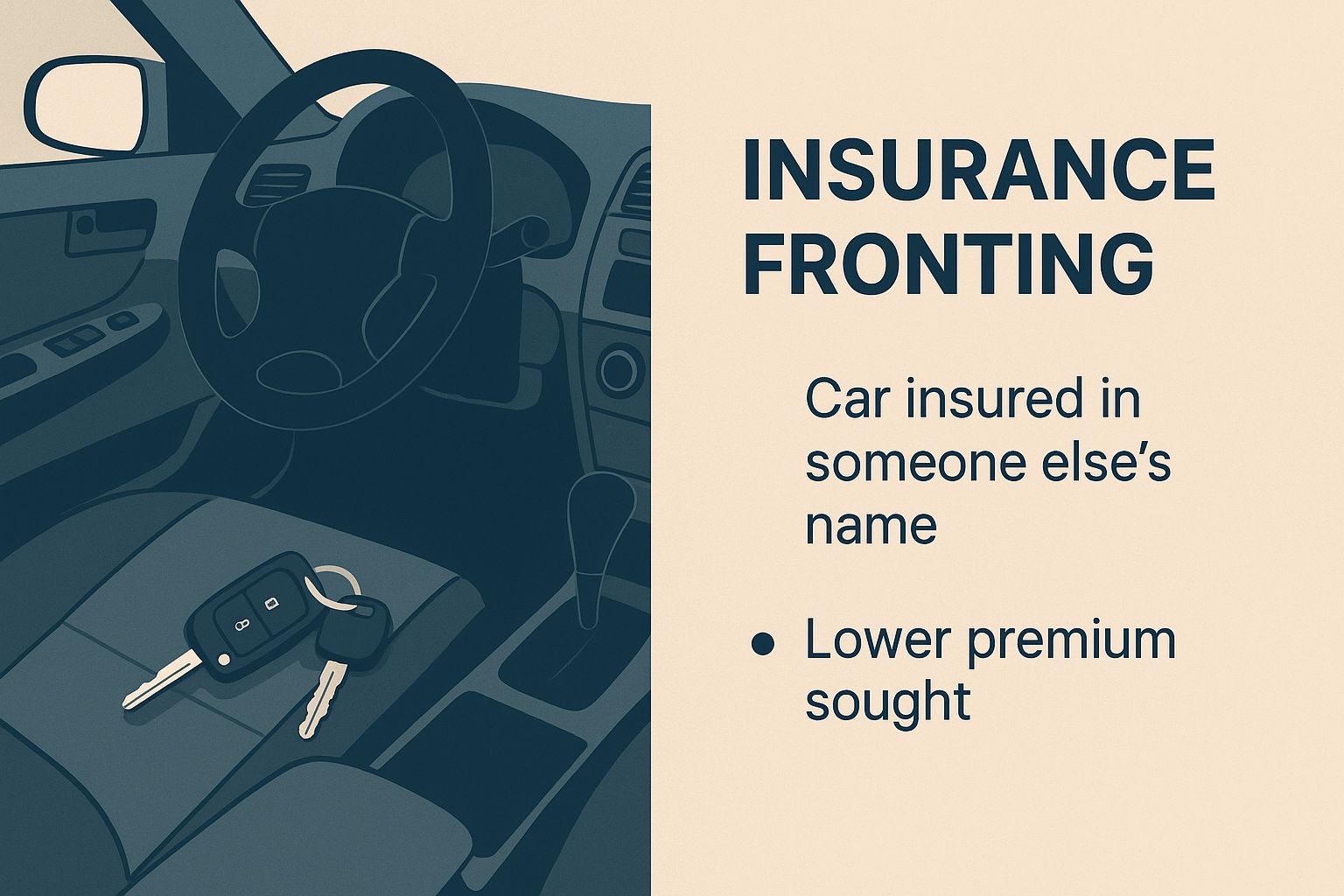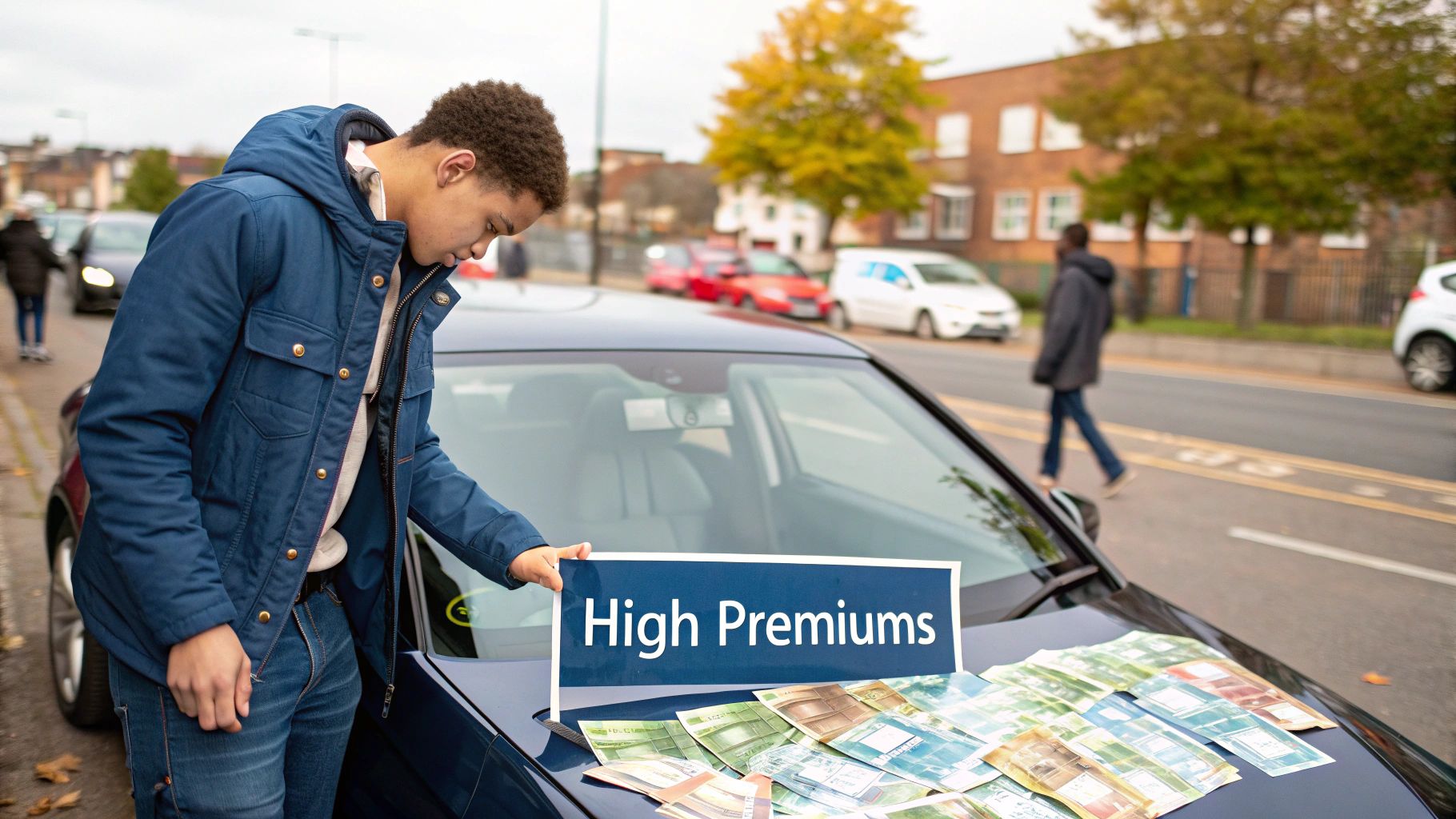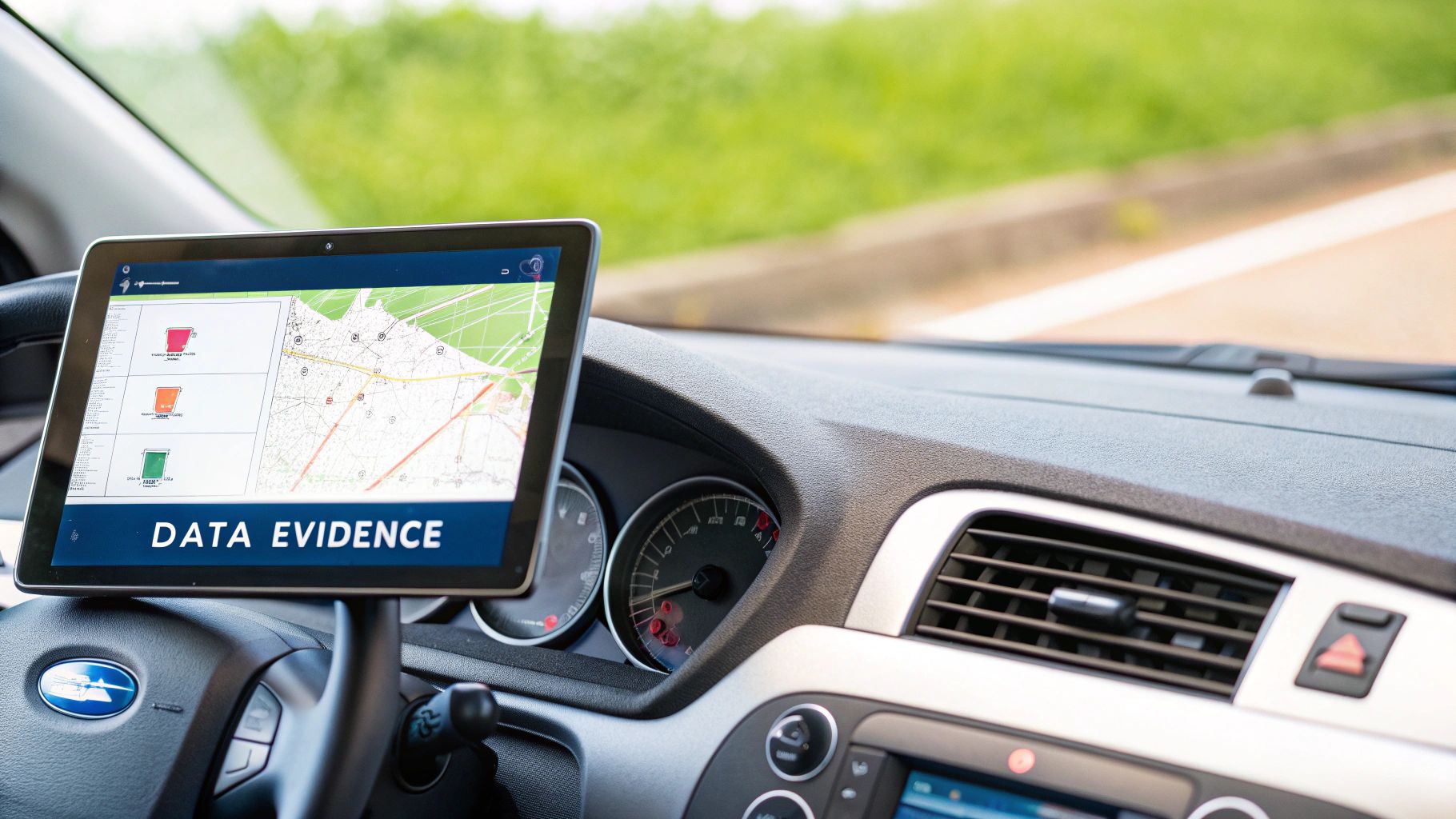What is Fronting in Insurance? Understand the Risks & Avoid Fraud
Let's get straight to it: what is fronting in insurance? Think about this common scenario: a parent puts their own name down as the main driver on their teenager's car insurance policy. They do this to get a much cheaper premium even though they know full well their teenager will be driving the car every single day.
This deliberate misrepresentation is what we call insurance fronting . It might seem like a clever trick to save a bit of cash but it is a serious form of insurance fraud. The provability of this fraud is often straightforward for insurers, and the costs to the industry and honest policyholders are substantial.
A Simple Way to Understand Insurance Fronting

This image of car keys on a seat gets to the heart of the matter—it’s all about the deception over who is truly in control of the vehicle.
At its core, an insurance policy is a contract built on trust and an honest assessment of risk. When you apply, the insurer calculates your premium based on the details you give them. They have to trust that the person listed as the main driver really is the one using the car the most.
Fronting is what happens when that trust is broken. A lower-risk individual, like an experienced parent, pretends to be the primary user to lock in a lower price. All the while, the actual, higher-risk main driver—often a young or newly qualified person—is only listed as an occasional, or ‘named’, driver.
While it might feel like a harmless white lie, the reality is that the entire policy is built on a false premise. And that comes with some pretty significant consequences.
The Key Players in a Fronting Scenario
To really grasp why this is fraudulent, it helps to break down the roles everyone is supposed to play. In a typical fronting arrangement, you have a clear case of deception where these roles are intentionally mixed up.
The table below clarifies the parts people play in this fraudulent setup, helping you see exactly where the lines get crossed.
Key Roles in an Insurance Fronting Arrangement
| Role | Description | Example |
|---|---|---|
| The Main Driver | The person who uses the vehicle most often for commuting, social trips, and daily errands. Their risk profile is the key factor in setting the premium. | A teenager who drives the car to college and work every day. |
| The Named Driver | Someone who only uses the car from time to time. Adding a genuine named driver to a policy is perfectly legal and very common. | A parent who borrows their child’s car once a month for a big shopping trip. |
| The Deception | This is the fraudulent act where the roles are deliberately swapped on the application to mislead the insurer and secure a cheaper rate. | The parent is listed as the main driver and the teenager as the named driver , even though the opposite is true. |
Essentially, the deception happens when these roles are dishonestly switched on the insurance application. The person who is genuinely the main driver is passed off as just an occasional user and that’s where the fraud lies.
Why Are Young UK Drivers So Tempted by Fronting?

Let’s be honest, people do not usually wake up one morning and decide to commit insurance fraud. For most UK families, the temptation of fronting boils down to one overwhelming pressure: the jaw-dropping cost of car insurance for young drivers.
When you’re staring at quotes that can easily spiral into thousands of pounds, the urge to find a cheaper way forward is completely understandable. This isn’t about being dishonest for the sake of it; it’s a reaction to a harsh economic reality.
This huge financial burden makes fronting feel less like a crime and more like a necessary shortcut. Parents just want to help their children get on the road and gain some independence without bankrupting the family. It is this protective instinct, clashing with eye-watering premiums, that pushes otherwise law-abiding people towards this illegal workaround.
The Scale of the Problem
The high cost of insurance for drivers under 25 isn't just an annoyance; it is a massive financial roadblock. And it is a widespread issue. A recent survey revealed that the average premium for a young driver in the UK is a shocking £2,217 a year .
That figure alone explains why so many parents feel backed into a corner.
The same survey found that nearly 7 in 10 UK parents of young drivers ( 69% ) admitted they either have already committed fronting or would consider putting their child’s car insurance policy in their own name to save money. You can read more about these findings on fronting temptations.
This statistic is startling. It shows just how normalised the idea has become, even though it is a clear-cut case of insurance fraud with very serious fallout.
At the end of the day, fronting is a gamble taken by families feeling the financial squeeze. They might see it as simply bending the rules to handle an unaffordable expense. What they often do not realise is the full extent of the legal and financial trouble they're inviting. The immediate prize of a lower premium can easily blind them to the devastating consequences if—or when—the deception is discovered.
The Real Consequences of Committing Insurance Fraud
Those supposed 'savings' from insurance fronting? They are a dangerous illusion. It is a gamble that falls apart the second you get caught, with consequences that are not just minor penalties but financially and legally devastating for everyone involved.
This usually comes to light when a claim is made. If you are involved in an accident, your insurer will investigate the details. The moment they discover the policy was fronted, they have every right to void the contract from the start .
Just like that, your insurance never existed, leaving you completely exposed. You are now personally on the hook for all the costs. That means footing the bill for your own vehicle repairs plus any third-party damages or injury claims—which can easily spiral into tens of thousands of pounds.
Severe Legal and Financial Penalties
The fallout extends far beyond the immediate costs of an accident. Driving without valid insurance is a serious offence and being caught fronting is a provable form of insurance fraud. It is not something the authorities take lightly.
The penalties can be life-altering:
- A criminal record for insurance fraud, which can haunt you when applying for jobs or travelling.
- Unlimited fines issued by the courts.
- Six to eight penalty points slapped onto your driving licence.
A surprising number of drivers simply do not grasp how serious this is. Research shows only about one-third ( 35% ) of young drivers realise they could face an unlimited fine. Even worse, just half ( 51% ) know that driving without proper insurance could lead to a ban. You can discover more about these findings from Aviva.
This lack of awareness is a real problem, especially when you consider that a staggering one in six young drivers ( 17% ) have admitted to being on a fronted policy.
Lasting Damage to Your Insurance Record
Even after you have dealt with the courts and paid the fines, the damage follows you for years. A fraud conviction paints a huge target on your back, labelling you as high-risk in the eyes of every insurer.
You will find it incredibly difficult, and eye-wateringly expensive, to get any kind of insurance cover in the future. Many providers will simply refuse to give you a quote, effectively blacklisting you from the market.
At the end of the day, that small, short-term saving is never worth the long-term financial exclusion and legal trouble that comes with it.
How Insurers Prove Fronting Is Taking Place

It is a huge mistake to think fronting is an easy secret to keep from an insurer. Providers have some surprisingly effective ways of uncovering this type of fraud, especially after a claim is made. The investigation usually kicks off the moment an accident is reported.
Insurers do not just take claims at face value; they scrutinise every detail to make sure the story adds up. They will look at who was driving, where the accident happened, and what time of day it was. If the ‘named driver’ seems to be constantly having incidents while commuting to work or college, that is an immediate red flag.
The heart of the investigation is simple: find out who truly uses the car the most. If all the evidence points to the named driver, the policy is fraudulent.
This is where modern technology makes proving fronting almost straightforward for insurers. Telematics, or ‘black box’ policies, are especially revealing because they provide indisputable data on driving habits. To get a sense of how insurers spot these schemes, it helps to understand the power of data analytics in driving user insights , which plays a massive role in uncovering dodgy activity.
Uncovering The Truth After an Incident
When a claim is filed, investigators get to work gathering evidence from multiple sources to build a clear picture of who the car’s primary user really is. This approach often leaves very little room for doubt.
Here are a few key methods they use:
- Analysing Telematics Data: A black box logs every single journey. This gives them concrete proof of who drives the vehicle most frequently, at what times, and for what sort of trips.
- Reviewing Social Media: Investigators may check public social media profiles. A young driver constantly posting about "their" new car can be used as compelling evidence.
- Gathering Witness Statements: After an accident, investigators often have a chat with neighbours, colleagues, or friends who can confirm who they see driving the car on a daily basis.
- Assessing Commute Patterns: If the car is consistently parked near the young driver's workplace or college campus, it strongly suggests they are the main user, not just an occasional one.
By piecing all this information together, insurers can easily prove the deception. The risk of getting caught really isn't a matter of 'if' but 'when', reinforcing that fronting is a gamble you are very likely to lose.
To learn more about preventing fraud before it even starts, take a look at our guide on fighting fraud before it happens with verified evidence.
The Hidden Cost of Fronting for All UK Drivers
Make no mistake, insurance fronting is not a victimless crime. The consequences spread far and wide across the insurance industry and sooner or later, they land at the feet of every single policyholder in the UK.
When an insurer is forced to pay out on a claim where the risk was intentionally misrepresented, they take a massive financial hit. But those costs do not just disappear. Instead, they get passed on to the rest of us in the form of higher premiums. There's a direct line connecting one person's decision to commit fraud and the rising cost of car insurance for everyone else. When an insurer’s costs go up because of fraudulent claims, they have no choice but to raise prices to stay afloat.
This puts even more pressure on a market already struggling with rising repair bills and vehicle theft, leaving honest drivers to pick up the tab for the dishonest few. So, while you might see premiums dip now and then, the constant pressure from fraud keeps prices higher than they ever should be.
The Broader Economic Impact
The combined cost of insurance fraud is staggering, placing a heavy burden on the UK economy. It is easy to think it only affects large, faceless corporations but that is not the case. Every fraudulent claim adds to a growing pool of debt that insurers have to recover from their honest customers. To get a sense of the sheer scale of the problem, you can read our detailed guide on what insurance fraud really costs the industry.
This tension creates a volatile market for everyone. Recent data from the Association of British Insurers (ABI) captures this perfectly.
While average comprehensive motor premiums fell by 16% to £757 over the past year, the underlying costs for theft and repairs continue to climb, putting immense pressure on insurers. This dynamic shows that while some drivers see relief, the high cost of claims, including those from fraudulent policies, could easily push premiums back up. You can read more about how claim costs are revving up on the ABI website.
Think about it this way: for every person who tries to cheat the system with fronting, countless others have to chip in a little extra on their own policies to cover the fallout. It is a hidden tax on honesty, all driven by a crime that many people wrongly believe harms no one.
Common Questions About Insurance Fronting
Insurance can be a tricky subject, so it is only natural to have a few questions. Let's clear up some of the most common queries about insurance fronting, so you can understand the difference between a legal arrangement and costly fraud.
Is Adding a Named Driver the Same as Fronting?
No, and this is a really important distinction to make. Adding a named driver to your policy is perfectly legal and very common. It is for someone who only uses your car occasionally.
The line is crossed into illegal fronting the moment that ‘named driver’ is actually the main driver, using the car far more often than the policyholder. The difference all comes down to honesty about who is genuinely behind the wheel most of the time.
If you are still a bit unsure where the line is drawn, our team answers many similar queries in our frequently asked questions section about insurance.
What Happens If I Have an Accident on a Fronted Policy?
If you have a crash and your insurer discovers the policy was fronted, they have the right to declare it void from the very start. This means they will refuse to pay for any damage to your car or for any claims from other people involved, leaving you on the hook for all the costs yourself. These bills can easily run into tens of thousands of pounds.
On top of that, you will be treated as if you were driving without any valid insurance at all. This can lead to:
- Unlimited fines from the courts.
- Penalty points on your driving licence.
- A potential criminal prosecution for fraud.
The consequences are so severe because the entire insurance contract was built on a lie. From the insurer's point of view, the policy was never valid, so they have zero obligation to cover any of the losses.
What Should I Do If My Policy Is Fronted?
If you realise you are on a fronted policy, you need to act fast and correct it immediately. The best thing to do is contact your insurance provider, explain the situation truthfully, and ask them to amend the policy to list the correct main driver.
Your premium will almost certainly go up but taking this step ensures you are legally insured. It is far better to face a higher cost now than to risk the devastating financial and legal fallout that comes with getting caught after an accident.
At Proova , we believe in making insurance clearer and more secure for everyone. Our platform helps verify ownership and streamline claims, reducing the risk of fraud and ensuring honest policyholders are protected. Find out how we are building a more transparent insurance landscape at https://www.proova.com.












